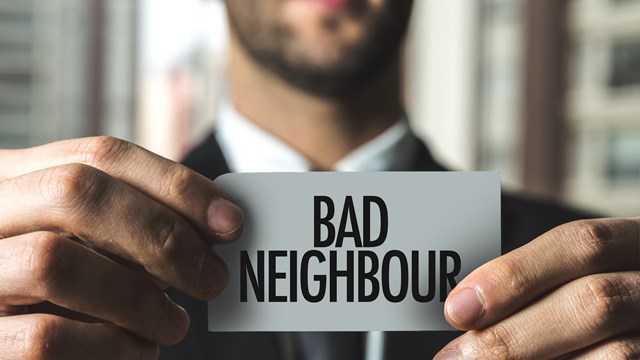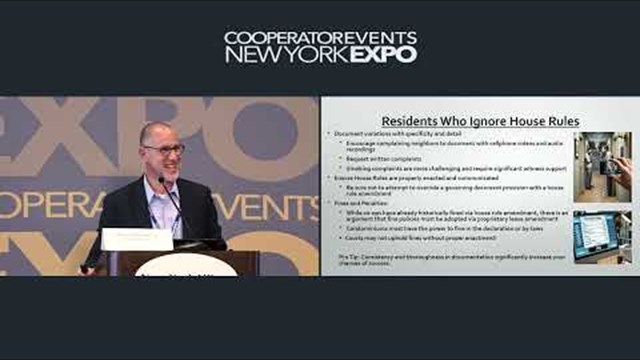Q. I live in a condo where there are quiet hours after 9 p.m., and all disturbing noise, no matter the time, can result in a fine. Two months after I moved in, the downstairs neighbor moved in, and it’s been a nightmare ever since. Banging, screaming, fights, rude guests who loiter and scream in front of the building. Three months after he moved in, I finally complained to the association, and they served the downstairs guy a cease and desist notice. Upon receiving it, he came directly to me and tried to smooth things over. It was shocking. He flat out admitted to being a drug dealer, and offered me illicit substances as an olive branch. I didn’t have my phone to record the convo, and wasn’t sure a record of it could be used anyway, given that he didn’t permit me to record it. At any rate, since then the noise level has gotten worse and worse. His live-in girlfriend screams frequently, and I’m told (by him) that she’s “hard to control when she’s drunk.” They have extremely loud sex at 1 a.m. while I’m trying to sleep; just today while on a work call, noise erupted from downstairs that could only be a psychotic episode from drug use, babbling sounds like speaking in tongues, thrashing, banging. I recorded the noise and sent it to management. They’ve told me over and over again to contact the police, but the police have told me they can only intervene if the resident is disturbing the peace or if there is a domestic disturbance. This is one for the books. Is anyone able to impart any advice?
—Shaken and Disturbed
A. “Living in a high-density city like New York certainly presents challenges to people living peacefully with one another when separated by thin walls, floors, or ceilings,” says attorney Adam Finkelstein of Manhattan law firm Kagan Lubic Lepper Finkelstein & Gold, LLP. “As such, there is a level of disturbance that must be accepted here that would not otherwise be expected in less concentrated areas. Day-to-day sounds during normal waking hours are just a fact of life that do not afford remedy, even though some may have a heightened awareness of those noises and are therefore more upset by such intrusions on their lives.
“Here, though, the letter-writer is describing sounds that appear to be beyond the norm. In this regard, while overhearing a conversation one afternoon through a common wall between apartments, or a person practicing their trombone at 8 p.m. every other day may be annoying, it does not rise to a level of being actionable; dealing with screaming, fighting, banging on walls, and loud sex during what would typically be deemed sleeping hours (after 11 p.m. and before 7 a.m.) does create a potential claim for the affected neighbor.
“The question though arises as to who has the burden of bringing this situation under control. In a cooperative, the responsibility could arguably fall on the board, because in that context the cooperative is the landlord and therefore has an obligation to provide habitable accommodations. If the noise level, timing, and frequency impacts the ability of the affected person to use their own apartment, the affected resident may be able to seek an abatement and avoid paying maintenance or a portion of the maintenance until the situation is resolved. In this case, however, the affected owner resides in a condominium. In a condominium there is no landlord-tenant relationship, and therefore no warranty of habitability. Therefore there is no obligation on the part of the board to address a noise issue as a condition of receiving monthly common charges. Likewise, while there may be condominium rules—and even the power granted to the board of managers under the bylaws to take action or impose fines for conduct that violates the rules—there is not usually a mandate that a board actually take such action on behalf of the affected unit owner, such action being discretionary by the board.
“Therefore, if the board here is not taking action with regard to these problems, the letter writer may be forced to bring its own action for nuisance against the offending neighbor. An action for nuisance allows the affected owner to seek damages that result from a neighbor’s actions on the neighbor’s property that are (a) substantial in nature, (b) intentional in origin, (c) unreasonable in character, (d) interfere with a person’s right to use and enjoy their property, and (e) caused by another’s conduct in acting, or failing to act. If the letter writer can prove these elements, they would be able to seek damages for the adverse impact this conduct is having on their use of their property.
“Of course, bringing an action for nuisance will take time and cost money. To the extent the letter writer is not prepared to spend either, they still do have the recourse of seeking police intervention. It is possible that the conduct cited violates criminal code, and that would give the police the ability to take action if they see fit. The problem is that the writer cannot compel the police to take action, as the police maintain the discretion with regard to enforcement of the laws in this context, which is beyond the writer’s control.”










4 Comments
Leave a Comment